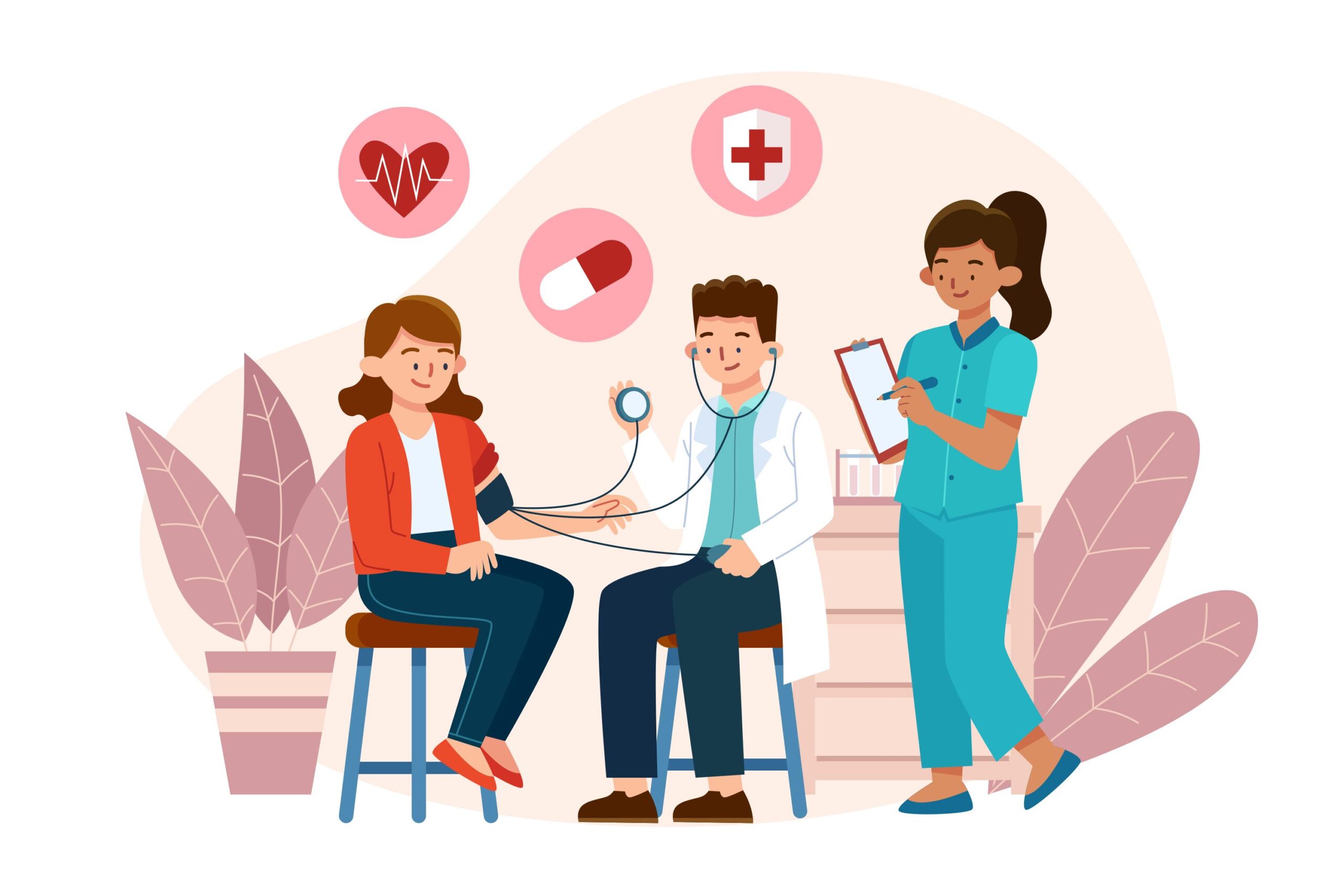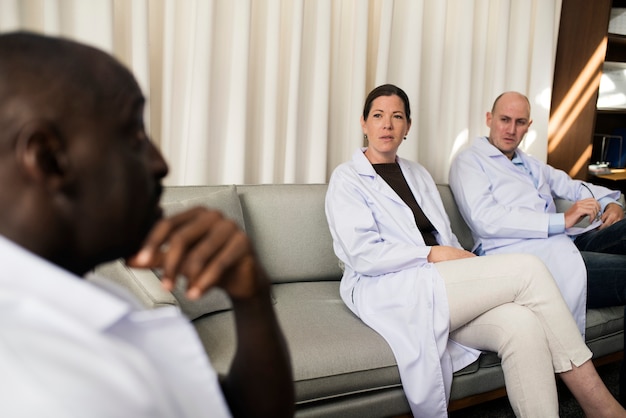Mental health technicians stand out in the context of the mental health care system as very indispensable figures.They provide direct care to persons suffering with mental health problems in the treatment phase, following their advancements and monitoring their safety.
As people are increasingly aware of mental health issues and as the need for care professionals continues to grow, this career is laden with one of the promising futures for those who wish to help others. This guide will explain the major responsibilities, career possibilities involved, and procedures on how to become a mental health technician with interesting tidbits on the profession.
What Does a Mental Health Technician Do?
An MHT is a specialist who provides mental health treatment to patients.The person might also be called a psychiatric technician sometimes, or even a behavioral health technician. These professionals are expected to carry out major responsibilities under the instructions and supervision of psychiatrists, psychologists, as well as other allied health professionals in managing care for patients suffering from mental health and behavioral disorders.

These duties will also change according to the specific services provided in residential psychiatric hospitals, residential treatment centers, or outside patient facilities.
Key Responsibilities of a Mental Health Technician
- Monitoring Patients:Observe patients behavior changes associated with emotional responses and wellbeing in writing. They report significant changes to medical staff.
- Providing Support: They also give emotional and psychological support to the patients about how they can manage anxiety and other symptoms related to stress and mental illness.
- Assisting with Activities:On a more dire level, they will help patients eat, dress, and take showers-the ones that become so dependent on others due to their emotional health body hardship.
- Observing and Documenting:A patient observer has all the important signs and symptoms of distress. It faithfully documents all happenings and records them accordingly. Proper maintenance of records is mandatory during continuous treatment.
- Administering Medications: In some instances, psychiatric technicians may apply or distribute drugs; this, however, might change in relation to set environments and laws per state.
- Ensuring Safety: Among many roles of a mental health technician, even posterity has a share in the safety of patients, especially those prone to self-harm or violent behavior. She also helps manage that person’s behavioral outburst or crisis.
Where Do Mental Health Technicians Make the Most Money?
In terms of pay, mental health technicians find themselves with varying payment schemes that differ geographically, apart from experience level and the kind of health care facility employed in practice.Some regions and states are paid because of high living costs. Other regions, however, pay higher because of demand and job responsibilities.
Highest Paying States and Regions for Mental Health Technicians
- California: In terms of population, California is considered one of the largest states and as a whole the state has the highest health facilities within itself. Mental health technicians are some of the best paying in the whole country as well. Los Angeles and San Francisco give the best pay but with high living costs.
- New York:New York, with its multiple healthcare avenues, offers good salaries for MHTs, especially for urban centers such as New York City.
- Texas:Texas is synonymous with lower costs compared to the good salaries earned by mental health technicians. Cities like Houston and Dallas have numerous opportunities.
- Florida: Florida also offers a good pay range for mental health technicians, especially in cities like Miami, where healthcare services are in high demand.
- Illinois: Chicago and surrounding areas in Illinois provide solid compensation for MHTs due to the region’s significant healthcare infrastructure.
Factors Affecting Salary
- Experience: The entry-level MHTs may earn less, while experienced professionals, having additional qualifications or special skills, could earn higher salaries.
- Setting: MHTs employed in such inpatient psychiatric units or hospitals earn more than those practicing outpatient or residential facilities.
- Certifications:Additional certifications and training such as crisis intervention or behavioral management may increase the earning potential of MHT.
How to Be a Mental Health Technician in Canada?
There are different steps and stages in becoming a mental health technician in Canada, including formal education, practical training, and experience in the field. Employment availability has been on the up-and-up regarding mental health technicians, making a career in this field quite bright in Canada.
Steps to Becoming a Mental Health Technician in Canada
- Complete Secondary Education:The requirement for an entry-level position is a high school diploma or equivalent.Likewise, courses in psychology, health or sociology may also be taken up.
- Pursue Post-Secondary Education:these are the colleges in Canada that train mental health technicians: diploma in psychiatric nursing or psychiatric support worker.These programs are generally a year to two in duration.
- Gain Practical Experience:Realistic practice is very crucial in this field. Many programs have internships, placements, or actual experience within healthcare institutions.
- Get Certified: These certificates are not necessarily needed; however, they usually enhance one’s job potential. In some provinces one may well require certification from the particular authority, while in some others may be available voluntary certifications via the professional associations.
- Apply for Jobs: Once you have completed the required education and training, you will be able to apply to work as a mental health technician within hospitals and clinics throughout Canada or in residential treatment centers.

What is Mental Health Technology?
In the phrase “mental health technology”, the mental health dimension involves technologies for diagnosing, treating, and managing mental health problems. This is the area that integrates health care with technology to create progressive modalities for delivering mental health services.
Key Aspects of Mental Health Technology
- Telemedicine:These telehealth platforms facilitate distance consultations and therapy for patients by mental health professionals. Made easy for people who stay in hard-to-reach areas.
- Mental Health Apps: There are many mobile applications today that help assess a person’s mental health; carry on going to therapeutic sessions; and lastly learn coping techniques.
- Data Analytics:Advanced data analytics can allow the mental health practitioner to track outcomes, identify patterns, and improve treatment plans.
- Virtual Reality:Virtual reality is now expanding more into the world of therapy, especially for its exposure therapies for patients with phobias or post-traumatic stress disorder.
- Artificial Intelligence:Artificial intelligence will create algorithms that can analyze patient data and predict future crises or developing conditions to allow timely interventions.
There are amazing possibilities that mental health technology will offer to better understand, provide treatment, enhance access and consequently improve the different outcomes patients achieve.
How to Work Through Mental Health Issues?
Mental health technicians give patients direct care, and on the other hand, there are many management strategies that the individual can apply. Here are some point to consider if you have any kind of mental health problem:
- Seek Professional Help:But, this proves absolutely false for mental health technicians since the majority of them work under the guidance of a therapist and psychiatrist. It really helps to contact someone who can listen to you, assuming that you’ve got any of these personal challenges.
- Develop Coping Strategies: Such professionals teach the patients how to cope with stress and anxiety and other conditions. They help their patients through various ways. Mindfulness, for example, is one of the effective ways that have been adopted by many to relieve stress. Relaxation, which includes breathing exercises, like reminders, is also another strategy.
- Build a Support System: Support that comes from family, friends, and peers can be valuable for someone trying to manage a mental health concern. Mental health technicians sometimes link patients with support groups.
- Practice Self-Care:Exercise, healthy diet, and sound sleep form the bedrock of mental health.
- Use Mental Health Apps: Even though there are many mental health apps aimed at tracking mind activity, they allow the users to reach yet another dimension of their world through proximity to therapists and facilities that can be accessed through technology.
Mental Health Technician Career Guide
The mental health technician career is one of those unique professions that directly bring forth a change in people’s lives. There is growing demand for mental health professionals, and mental health technicians help fill that need.
Required Skills and Qualifications
- Empathy: Candidates for mental health technician roles must demonstrate exceptional levels of empathy, as well as an understanding of the challenges patients have to face seriously.
- Communication Skills:Excellent verbal and written communications allow recording patients’ progress with others within the healthcare team.
- Patience: To work with patients suffering from a mental disorder, it requires someone with a lot of patience and keeping cool-headedness through tough situations.
- Physical Stamina: The job can physically tax- especially in terms of lifting patients with mobility problems or who have behavior incidents.
Career Advancement Opportunities
A little work experience and improvement through further education can lead mental health technicians to advancement into roles like:
- Psychiatric Nurse
- Behavioral Health Specialist
- Mental Health Counselor
- Healthcare Administrator
Psychiatric Technicians and Aides
Psychiatric technicians and aides are the terms that are mostly associated with the meaning of mental health technicians. These terms may have slight differences depending on the setting and the specifications of the job description, but most of the time they conduct the same duties.
Differences Between Psychiatric Technicians and Aides
- Psychiatric Technicians:Would gain more qualifications training and certification and may do procedures under the supervision of either a doctor or nurse.
- Psychiatric Aides:It usually facilitates helping patients with daily living activities and providing emotional support to people.
Day in the Life of a Mental Health Tech
An unpredictable day for a mental wellness technician; each patient has different levels of care and attention requirements. Here’s an outline of a typical day:
- Morning Routine:Consulting with the members of the team, reviewing patient reports, and ensuring that equipment is ready to use.
- Patient Interaction:Interacting with patient clients in a way that helps them appreciate or improve their emotional state and helps them perform activities of daily living.
- Record Keeping: Recording and reporting any changes in patient behavior.
- Monitoring: Has them being given close supervision for observation for any signs of distress or possible self-harm.
- Afternoon Duties: Aiding patients with therapies and medications, and gives help with personal hygiene.
Careers as a Mental Health Technician
Working in a number of different health care settings, such as:
- Hospitals:caring for inpatients with severe mental illness disorders.
- Residential Treatment Centers:help patients remain in long-term care.
- Outpatient Clinics:provide support for therapy and psychiatric services on an outpatient basis.
- Correctional Facilities:work with inmates with mental health issues.
- Community Health Centers: participate in a larger team to provide community mental health services.
The Growing Demand for Mental Health Technicians
This demand has increased globally for trained professionals in the mental health field, and now there is an expectation of an even greater demand for mental health technicians. Mental health technicians play a vital role in ensuring that health care delivery in medicine and psychiatry are translated, particularly at the two points of contact, emergency situations and regular routine patient encounters.In this time of critical mental health crises-increasingly common since the time of last post-pandemic activities-mental health technicians have become some of the most sought-after professionals in their field.
Hospitals, clinics, residential treatment centers, and some schools employ these to take care of the ever-growing need for mental health treatment. The above turns out to be a window of opportunity for an individual who wants to step into a stable, fulfilling, and meaningful line that personally affects people’s lives.
The Role of Technology in Mental Health Care
Technological advancement in the area of patient care is changing the delivery of mental health services. Today, mental health technicians incorporate technology into their work to improve the quality of service they provide directly to patients. The technologies include EHRs, or electronic health records, which help clinicians capture accurate patient information; mental health apps providing virtual patient support; and other modes of assessment and monitoring of patients.
Telehealth is also providing patients with access to care, whereby a mental health technician can provide services from anywhere, particularly for those who are more likely to be underserved otherwise and at the same time tailor the service to suit patient needs. As technology improves, so would the mental health technician have to keep in touch with more recent tools and methods that can further help in adequately assisting patients and also advance the career of the profession as the health care landscape changes.
The Impact of Mental Health Technicians on Patient Outcomes
All patients entering the mental health system usually go through a mental health technician. Their work transcends provision of basic physical services to include the creation of a very important healing environment in which trust and open communication can happen. Early identification of the signs of distress or crisis by a mental health technician can serve as a very potent intervention whose outcome will most likely make a difference in the patient’s treatment outcome.Intervention has the potential to improve treatment outcomes.

By taking an active role in their own use of mental health services, patients are taught by mental health technicians how to self-manage symptoms and behaviors so that hospitalization or more extreme intervention is not necessary. These technicians further teach patients self-care and coping mechanisms, which are in fact the building blocks of constant wellness in patients over time.The hands-on compassionate care provided by such professionals is a very important factor in enhancing overall patient experience, making them integral to the mental health care system.
Conclusion
To conclude, mental health technicians are important personnel in the healthcare system, providing significant support for patients with psychiatric disorders among others. Hence, the career opportunities in this field continue to be many as demand for mental health services is seen to grow. It is important to know the responsibilities and skills, as well as pathways for progressing in this career, whether as a beginner in the field or someone going further in the field, to succeed as a mental health technician.











Leave a Reply